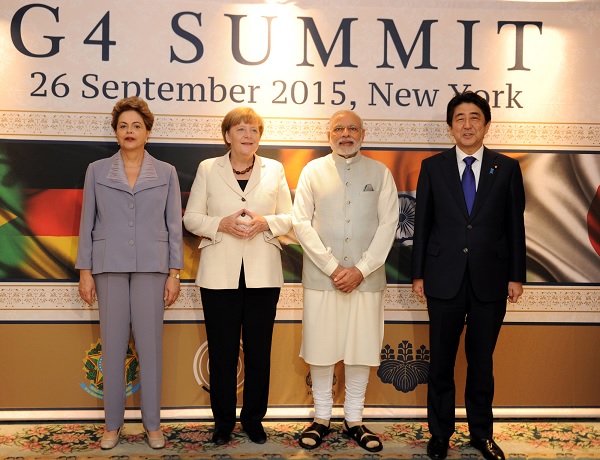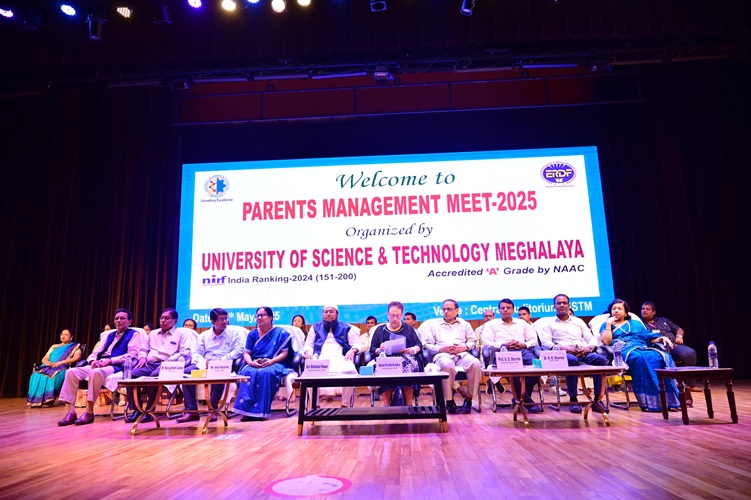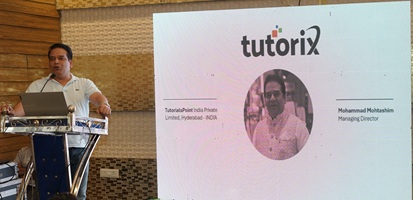 New York: (IANS) Buoyed by the breakthrough in the UN General Assembly for Security Council reforms, India and other G4 countries of Brazil, Germany, Japan declared on Saturday they would redouble their efforts to get concrete results during the current session, as they were “legitimate candidates” for permanent membership in an expanded and reformed council.
New York: (IANS) Buoyed by the breakthrough in the UN General Assembly for Security Council reforms, India and other G4 countries of Brazil, Germany, Japan declared on Saturday they would redouble their efforts to get concrete results during the current session, as they were “legitimate candidates” for permanent membership in an expanded and reformed council.
In a joint statement after their summit, convened by India, the G4 leaders “pledged to work together with all member states and to accelerate outreach towards achieving an early and meaningful reform of the Security Council”.
Prime Minister Narendra Modi, who hosted the summit at the Waldorf Astoria Hotel, said: “The UNSC must include the world’s largest democracies, major locomotives of the global economy, and voices from all the major continents.”
The four countries were ready to assume the responsibilities of permanent members of the Council, he said, adding they “stood firm on ensuring and contributing to global peace and security”.
In his opening remarks, Modi said that since UN’s formation in 1945, members have increased four-fold, global economy and demography have changed and the challenges increased, “yet our institutions, approaches, and often mindsets, reflect the wisdom of the century we have left behind, not the century we live in”.
“This is especially true of the United Nations Security Council,” he said.
The four countries – among the 10 biggest economies in the world – are pushing for inclusion as permanent members in an expanded Security Council, which currently has five permanent members — China, France, Russia, Britain and the US. Ten non-permanent members are elected for two-year terms by the General Assembly.
The first G4 summit in over ten years, it was attended by German Chancellor Angela Merkel, Japanese Prime Minister Shinzo Abe and Brazilian President Dilma Rousseff.
Reiterating his target for the changes, Modi said the commencement of text-based negotiations of the UNSC, set for November, “is an important first step but it must be carried to its conclusion in the 70th UN General Assembly”.
The joint statement endorsed the goal, saying: “They expressed determination to redouble their efforts towards securing concrete outcomes during the 70th session of the General Assembly.”
Rousseff, in her remarks, said the present council, with the five permanent members, is “insufficient representation” of the changed world order.
“We need a council that will reflect the proper representation of world powers.. and is effective,” she said, adding that Brazil gives its “firm commitment” to G4 efforts.
She also said results achieved so far have not been very substantial and called for a better, concerted effort at sensitizing the global community
Merkel said the G4 needs to try to find allies and talk to others to meet its goals.
Noting the world has changed since the formation of the UNSC 70 years ago with state and non-state actors, terrorists, and “I have never seen as many refugees”, natural disasters, she said: “It makes it incumbent on the UN to reform, of the UNSC to better reflect the distribution of powers. We need to be prudent and talk to the others to change the format of the UNSC.”
Abe said the grouping “must respond to voices of the majority of nations” seeking UNSC reform.
The joint statement said that the G4 “supported Africa’s representation in both the permanent and non-permanent membership in the Security Council”.
The group’s efforts got a boost earlier this month when the assembly endorsed a negotiating text for council reform. The reform efforts had been bogged down for over a decade because the negotiations could not proceed without a negotiating text on which to base the discussions.
Countries like Pakistan, China and Italy that opposed reform had been blocking the introduction of a negotiating text. During the last session, its president, Sam Kutesa of Uganda, got it to endorse a negotiating text on its final day. The text was compiled under leadership of Courtenay Rattray of Jamaica who was appointed by Kutesa to revitalise the Inter-Governmental Negotiations (IGN) process for reform.
The G4 summit acknowledged their efforts in the joint statement saying: “The leaders paid tribute to the dynamic leadership of the president of the 69th General Assembly and the efforts of the chair of the Inter-Governmental Negotiations (IGN) in moving the IGN process towards text-based negotiations.”
They also noted the support for text-based negotiations from the African Group, CARICOM, which represents Caribbean nations, and the L.69 Group, a 42-member group of developing countries from Africa, Latin America and the Caribbean, Asia and the Pacific.





0 Comments